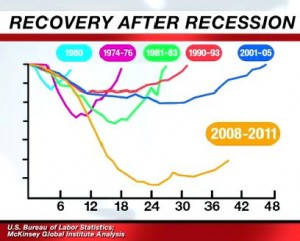Bless me my conscience; it has been seven months since my last post. In that time, we have witnessed the Republican presidential primary process deliver Mitt Romney—as clear an example of the top 1% as you can get.
We need to think about his success and the success of the 1% in general in a different way than Romney would like, or can even get his mind around. In the conservative worldview, which most of us accept without question, Romney is a winner. He played the game of wealth creation well, and is exactly what we all want to be like: rich (not stiff and awkward). Who doesn’t want to be rich?
In this prevailing worldview the accumulation of vast wealth is what all individuals seek. Along the way jobs will be created, investments will be made, and society will benefit. And this is true to a degree. But jobs are only a once-in-while by-product of wealth accumulation; many times the loss of jobs creates wealth for owners.
The unbounded creation of wealth for the top 1% is also sequestering resources that the rest of us need to be healthy. Imagine if one rich farmer had hundreds or thousands of times more water than the other farmers and there was a drought. This farmer sold the water, but if you couldn’t pay, oh well. I hope you don’t starve.
One person controlling all the precious water is a big problem. What would happen? Would the other farmers attack the rich farmer? Would they be justified in doing so? Would the government back the majority of desperate people and send troops to free the water, or be bought off by the rich farmer and send troops to keep the thirsty, starving mob at bay?
In this metaphor, water equals money. But both actually equal energy. No water, no energy for the growth of a crop. No money, no energy for the growth of the economy. By playing the game of individual wealth creation, which we all do, the winner’s jackpot is now detrimental to everyone else. The irrigation system of the economy is dry, not because there isn’t enough money, but because the flow is being restricted and tightly controlled. Money is flowing not to dehydrated everyday people but into the endless reservoirs of the 1%.
Never mind that people are dying or becoming homeless because they can’t pay their medical bills. In the system we’ve bought into Romney wins and we all lose. It’s perfectly fair that he get as much as he can. Concern for the losers is not part of the equation. But since money is the energy needed for growth, look for higher costs in blood when that energy is not forthcoming.

